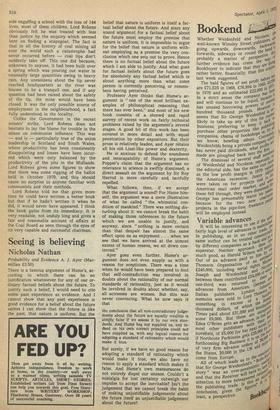Seeing is believing
Nicholas Nathan
Probability and Evidence A. J. Ayer (Macmillan £3.50) There is a famous argument of Hume's, according to which there can be no justification whatsoever for any of our ordinary factual beliefs about the future. To justify such a belief, I would need to cite some past experience as evidence. And I cannot show that any past experience is good evidence for a belief about the future unless I can show that the future is like the past, that nature is uniform. But the belief that nature is uniform is itself a factual belief about the future. And since any sound argument for a factual belief about the future must employ the premise that nature is uniform, it is impossible to argue for the belief that nature is uniform with out employing as a premise the very conclusion which one sets out to prove. Hence there is no factual belief about the future which I am able to justify. And what goes for factual beliefs about the future goes for absolutely any factual belief which is about anything more than what some person is currently perceiving or remembers having perceived.
Professor Ayer thinks that Hume's argument is "one of the most brilliant ex amples of philosophical reasoning that there has ever been," and most of his new book consists of a shrewd and rapid survey of recent work on fairly technical problems raised by the argument's several stages. A good bit of this work has been covered in more detail and with equal penetration by other expositors. But their prose is relatively leaden, and Ayer retains all his old Liszt-like power and dexterity.
He is anxious to defend the soundness and inescapability of Hume's argument.
Popper's claim that the argument has no relevance to science is swiftly dismissed; a direct assault on the argument by Sir Roy Harrod is more carefully and, tactfully repelled.
What follows, then, if we accept that the argument is sound? For Hume him self, the argument was a mere illustration of what he called "the whimsical condition of mankind." There was nothing dis turbing about it: we cannot break the habit of making those inferences to the future which we are unable to justify, and anyway, since "nothing is more certain than that despair has almost the same effect upon us as enjoyment . . . when we see that we have arrived at the utmost extent of human reason, we sit down contented."
Ayer goes even further. Hume's argument does not even supply us with a reason for scepticism. There was a time when he would have been prepared to hint that self-contradiction was involved in doubts about the rationality of our normal standards of rationality, just as it would be involved in doubts about whether, say, all actresses are women. But this was never convincing. What he now says is that the conclusion that all non-contradictory judgements about the future are equally credible is simply false if we assess it by our own standards. And Hume has not supplied us, and indeed on his own correct principles could not have supplied us, with any logical reason for adopting a standard of rationality which would make it true.
But surely, if we have no good reason for adopting a standard of rationality which would make it true, we also have no reason to apply a standard which makes it false. And Hume's own reassurances do not entirely dispel our unease. Couldn't a nostalgia for lost certainty outweigh our impulse to accept the inevitable? Isn't the judgement that we cannot break the habit of making unjustifiable judgements about the future itself an unjustifiable judgement about the future?


































 Previous page
Previous page